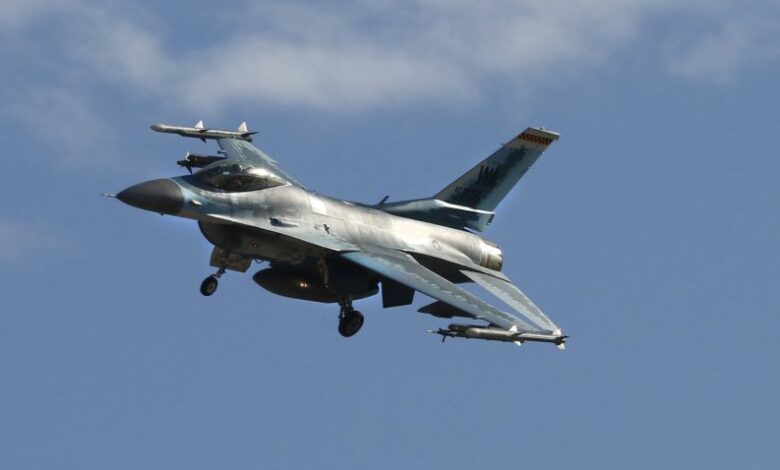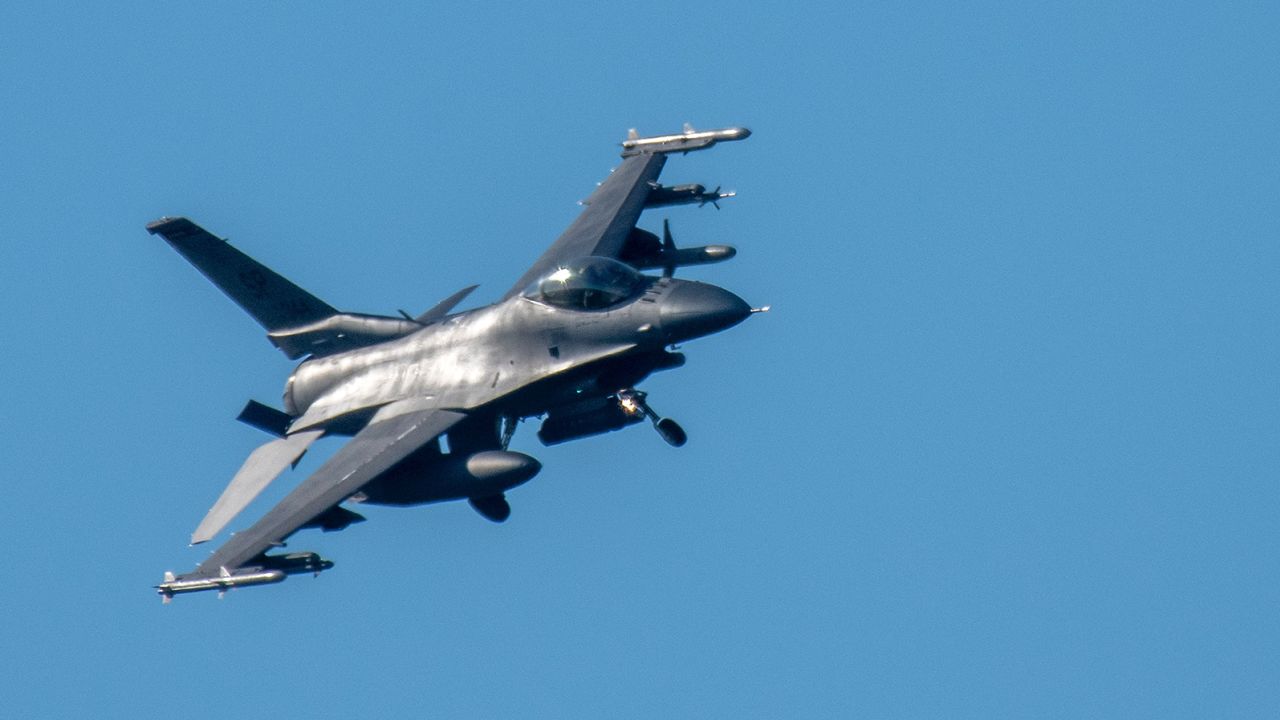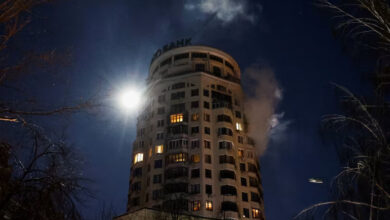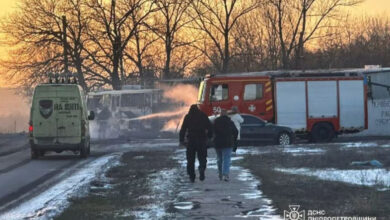
Biden’s comments at a summit with G7 leaders in Japan came days after Britain and the Netherlands said they were building an “international coalition” to help Ukraine procure F-16s as it seeks to improve its defenses against Russian air attacks.
The F-16s would be an upgrade to the largely Soviet-era aircraft currently in Ukraine’s fleet. President Volodymyr Zelensky welcomed Biden’s decision, saying in a tweet, “this will greatly enhance our army in the sky.”
But analysts cautioned that the jets aren’t a cure-all and have vulnerabilities that Moscow would be well aware of and could exploit.
In fact, one active duty F-16 pilot told CNN that expectations may be way too high.
“To your question about the F-16 being a difference maker. It’s not,” said the pilot, who requested anonymity because they were not authorized to speak on the subject.
Here’s what you need to know about the F-16.

World’s most active fighter jet
F-16s are single-engine, multirole jet aircraft, meaning they can be used in air-to-air or ground-attack missions.
The US Air Force calls the F-16, which first flew in the 1970s, a “relatively low-cost, high-performance weapon system.”
Thousands of the jets have been built over the decades, and hundreds have been exported around the world.
According to Flight Global’s World Air Forces directory, almost 2,200 F-16s are active worldwide this year, making it the single most popular combat aircraft across the planet with 15% of the world’s fleet.
F-16s for Ukraine are expected to be older versions that have been in the fleets of US allies, especially those in Western Europe.
Analysts say the F-16s Ukraine would receive are not the oldest ones out there, but aircraft that have undergone what are called “mid-life upgrades,” meaning they’ve gotten improvements to avionics and software.
Ukraine has said it needs about 200 F-16s, so the numbers would work out.
“There is a surplus of F-16s in Western nations, offering immediate availability and a well-established logistics trail,” said Robert Hopkins, a military aviation author and former US Air Force pilot.
“There are other aircraft more capable than the F-16, but they are fewer in number and are not available to transfer,” Hopkins added.
Those more-capable aircraft are probably ones that you commonly hear about, US-made F-35s and F/A-18s or French Rafales, for instance.
And there are others that are lesser known.
“The best aircraft technically would arguably be the Swedish Grippen because of its combat capabilities, ability to operate from austere bases and easier maintenance,” said Peter Layton, a fellow at the Griffith Asia Institute and former Royal Australian Air Force officer. “However, their annual production rate is low and there are none available off the shelf.”
Layton gives the Netherlands as a prime example of how the F-16 might be the easiest answer for Ukraine.
“The Dutch (have) about 40 F-16s on hand. These Dutch aircraft have been progressively upgraded, have relatively modern radars and avionics, and are able to use advanced weapons,” Layton said.
Keeping F-16s in the sky
The analysts say the sheer numbers of F-16s active around the world means they have an established logistics trail and a good number of spare parts available – important components to keep the jets combat capable.
But they also note that for a modern fighter jet like the F-16, training maintenance personnel can take longer than training pilots.
“I think it’s possible to teach a Ukrainian pilot to fly an F-16 in three months,” Layton said.
But “training maintenance personnel can take months or years, depending on the desired level of proficiency,” according to a March report on the possible F-16 transfers from the Congressional Research Service (CRS).
Even after undergoing up to 133 days of schooling, a US Air Force maintainer gains a year of on-the-job experience to become fully qualified, the CRS report says.
And the report notes that there can be a numbers problem. F-16s need a lot of maintenance; 16 hours per hour of flying time, it says.
As for pilot training, Layton and the active F-16 pilot who spoke to CNN both say three months of training is for the basics – getting the plane up in the air, keeping it there and landing it safely. Combat roles become much more complex, however.
F-16s are easy to learn how to fly, but employing them effectively in “a dynamic threat environment” could take years, according to the pilot.
“Learning to fly an F-16 is only one part of the battle. American pilots first learn to fly, then they learn how to lead two F-16s, then four F-16s. This is a multi-year process, and that’s just for the basic tactical unit of employment,” the F-16 pilot said.
Layton said Ukraine’s current jet fighter pilots have proven adept, and could “learn on the job” in the F-16s if confining themselves to air defense, shooting down intruding Russian aircraft or missiles, in the short term.
“My logic falls away if trying to teach them low altitude night/all-weather ground attack using infrared systems and laser guided bombs; this would take longer,” Layton said.
How do you hide F-16s?
Then there is the question of where Ukrainian F-16s would be based.
“F-16s do best on long, pristine runways. They could face difficulties on the rougher, former Soviet ones dispersed across Ukraine,” RAND Corp. analysts John Hoehn and William Courtney wrote in a blog post earlier this month.
“To bring in Western aircraft, Ukraine might need to repave and potentially extend a number of runways, a process which Russia would likely detect. If only a few airfields were suitable and in known locations, focused Russian attacks could impede Ukrainian F-16s from flying,” they wrote.
Assuming Ukraine can overcome logistics and maintenance hurdles, and find secure runways from which to fly F-16s, they still need the right armaments to be effective against the key fighter jets Russia is using, like the Su-25 and MiG-31, analysts say.
“The advantages of transferring advanced western fighter jets in seeking air superiority are likely to be realized only if paired with large quantities of western-manufactured munitions,” the CRS report says.
Advanced western armaments for the F-16s would be expensive.
For instance, a single Advanced Medium Range Air-to-Air Missile (AMRAAM) costs about $1.2 million, CRS says, adding that it takes about two years to make one.
The US could provide AMRAAMs and other arms from its stockpile, but with the long manufacturing times, it runs the risk of its own inventories being depleted if needed in a conflict directly involving US forces, the CRS says.
The political war and the future
Despite all the possible drawbacks to F-16s, Hopkins said a political war is being fought, and victories are needed in that battlespace.
Getting F-16s to Ukraine would demonstrate “a powerful political and diplomatic collaboration across multiple Western (and especially NATO) countries,” he said.
Layton said Ukraine needs to take a long view, too.
Kyiv is not going to be able to get replacements for its current Soviet-era aircraft as they wear out or are lost in combat, he said
“Over time, there will be no combat-effective Ukrainian air force. They need new aircraft for future air defense tasks,” he said.
Transitioning to a Western-made fleet now makes sense, he said.
But the war in Ukraine shows no sign of ending soon, and the current F-16 pilot doesn’t see the planes hastening the end of it.
“Getting the Ukranians F-16s will be a morale boost and add some limited combat capability, that’s all,” the pilot said.
“It might do a couple of strikes over the next year and have some wins, but no one airplane will change the course of the war.”




